When it comes to nutrient-dense leafy greens, Egyptian spinach takes the crown. Packed with a powerhouse of vitamins, minerals, and antioxidants, this leafy green vegetable offers an impressive array of health benefits. From boosting the immune system to promoting better sleep, Egyptian spinach is a versatile ingredient that can easily be incorporated into your diet. And the best part? You can even grow it in your own backyard, ensuring a steady supply of this nutritious leafy green. Read on to discover the tips for growing Egyptian spinach and the amazing nutrition benefits it provides.
Key Takeaways:
- Egyptian spinach is a nutrient-dense leafy green vegetable packed with vitamins, minerals, and antioxidants.
- It offers numerous health benefits, including boosting the immune system, aiding digestion, and improving heart health.
- You can easily grow Egyptian spinach in your own garden, providing a continuous harvest for your enjoyment.
- From salads to stews, Egyptian spinach is a versatile ingredient that can be enjoyed raw or cooked in various dishes.
- With its rich historical significance and interesting legends, Egyptian spinach is not just a nutritious vegetable, but a fascinating one as well.
What is Egyptian Spinach?
Egyptian spinach, scientifically known as Corchorus olitorius, is a leafy green vegetable that belongs to the family Tiliaceae. It is also referred to as Jew’s mallow, jute mallow, or by its Arabic name “Molokhia.” The plant is erect, unbranched, and grows quickly, making it easy to cultivate.
The leaves of Egyptian spinach are rich in potassium, calcium, phosphorus, iron, ascorbic acid, and carotene. They are also a good source of protein, folate, magnesium, vitamins, and dietary fiber.
The plant is native to Egypt but is now grown in various countries, including Sudan, Malaysia, the Philippines, India, and Thailand. It is widely consumed in tropical Africa, South America, Australia, and parts of Europe.
Egyptian spinach is commonly used in traditional medicines due to its numerous health benefits.
Leafy Greens with a Nutritional Punch
When it comes to leafy green vegetables that pack a nutritional punch, Egyptian spinach, also known as Jew’s mallow or jute mallow, is a standout. This versatile green is not only delicious but also a nutritional powerhouse, offering an array of vitamins, minerals, and other essential nutrients.
- Vitamins: Egyptian spinach is a rich source of vitamins, including vitamin A, vitamin C, and several B vitamins. These vitamins play a vital role in maintaining healthy body functions, supporting immunity, and promoting overall well-being.
- Minerals: This leafy green vegetable is a good source of important minerals such as potassium, calcium, iron, and magnesium. These minerals are essential for maintaining proper hydration, strong bones, healthy blood circulation, and optimal organ function.
- Antioxidants: Egyptian spinach is packed with antioxidants that help protect the body from oxidative stress caused by harmful free radicals. These antioxidants play a crucial role in reducing inflammation, combating signs of aging, and supporting overall health.
- Dietary Fiber: With its high fiber content, Egyptian spinach aids in digestion, promotes a feeling of fullness, and supports healthy weight management.
With so many nutritional benefits, it’s no wonder that Egyptian spinach is gaining popularity worldwide.
How to Grow Egyptian Spinach
When it comes to growing Egyptian spinach, you’ll be pleased to know that it’s a relatively easy task, even in warm climates like Arizona. This resilient leafy green thrives in optimal conditions and can provide a bountiful harvest throughout the growing season. Here’s a step-by-step guide to help you successfully grow your own Egyptian spinach:
- Planting: The best time to plant Egyptian spinach is in the spring, after the risk of frost has passed. Dig a small trench or hole, approximately ¼ inch deep, and space the seeds around two inches apart. Pat the soil gently to cover the seeds and ensure good contact.
- Optimal Conditions: Egyptian spinach plants prefer full sun and well-draining soil. Make sure to choose a sunny spot in your garden or use containers if space is limited.
- Watering: Providing adequate water is crucial for the healthy growth of Egyptian spinach. You can use ollas, clay pots buried in the soil, to allow the plants to take up the exact amount of water they need. Alternatively, sprinklers can be used, watering once a day for 20 minutes during hot summer temperatures. However, be careful not to overwater, as this can lead to root rot.
- Spacing: Egyptian spinach plants have a shrub-like growth pattern, so it’s important to consider their spacing needs. Plan for approximately 24-36 inches between plants to allow room for their mature size. Proper spacing ensures good air circulation and prevents overcrowding.
- Outdoor Cultivation: Egyptian spinach is well-suited for outdoor cultivation. As the plants mature, they will form dense, vibrant foliage that can provide shade to other heat-sensitive plants in your garden.
- Self-Seeding: Once established, Egyptian spinach plants have a tendency to self-seed. This means that they will produce new plants that can continue growing in subsequent seasons without requiring additional effort on your part.
By following these simple steps, you can enjoy a continuous and abundant harvest of fresh Egyptian spinach right from your own backyard.
Benefits of Growing Egyptian Spinach
There are several benefits to growing Egyptian spinach:
- Easy cultivation
- Continuous harvest throughout the growing season
- Self-seeding for low-maintenance gardening
- Fresh, homegrown produce for a healthy diet
- Reduced reliance on store-bought greens
With these advantages in mind, why not give Egyptian spinach a try in your garden this season?
The Nutritional Value of Egyptian Spinach
Egyptian spinach is a highly nutritious vegetable that offers a wide range of health benefits. Packed with essential vitamins and minerals, it is an excellent addition to a balanced diet.
Vitamins in Egyptian Spinach
Egyptian spinach is rich in various vitamins, including:
- Vitamin C: Egyptian spinach contains a significant amount of ascorbic acid, which plays a crucial role in immune function and collagen production.
- Vitamin A: It is also a good source of carotene, a precursor to vitamin A. This vitamin is essential for maintaining healthy skin, vision, and immune function.
- Vitamin B1: Egyptian spinach is a great source of thiamin, which is involved in energy production and supports proper nerve function.
- Vitamin B2: It also contains riboflavin, which is important for energy metabolism and the maintenance of healthy skin and eyes.
- Vitamin B3: Niacin is found in significant amounts in Egyptian spinach. It plays a vital role in converting food into energy and maintaining proper nervous system function.
- Vitamin B9: Folate, or vitamin B9, is essential for DNA synthesis and plays a crucial role in fetal development and red blood cell production.
Minerals in Egyptian Spinach
Egyptian spinach is also a rich source of minerals, including:
- Potassium: This mineral is essential for maintaining fluid balance, regulating blood pressure, and supporting proper muscle and nerve function.
- Calcium: Egyptian spinach provides a good amount of calcium, crucial for healthy bones, teeth, and muscle function.
- Phosphorus: It is also rich in phosphorus, which is necessary for strong bones and teeth, energy production, and cell growth and repair.
- Iron: Iron is an important mineral for the production of red blood cells and the transportation of oxygen throughout the body.
- Magnesium: Egyptian spinach contains magnesium, which is involved in numerous enzymatic reactions in the body and plays a critical role in energy production and bone health.
Health Benefits
The nutritional profile of Egyptian spinach contributes to its numerous health benefits:
“Egyptian spinach is not only delicious but also offers a wide range of health benefits. Its high vitamin C content boosts the immune system and promotes healthy skin. The presence of iron helps prevent anemia and supports oxygen transport in the body. Additionally, the abundance of potassium supports heart health by regulating blood pressure. Vitamin A and carotene are essential for maintaining healthy vision and promoting good overall health. Furthermore, the dietary fiber in Egyptian spinach aids digestion and promotes a feeling of fullness. Including this nutrient-packed vegetable in your diet can support your overall well-being and contribute to a healthy lifestyle.”
Not only does Egyptian spinach provide essential vitamins and minerals, but it also contains antioxidants, such as polyphenols and flavonoids. These antioxidants help reduce inflammation, neutralize harmful free radicals, and prevent age-related diseases.
Moreover, Egyptian spinach contains omega-3 fatty acids in higher amounts compared to other vegetables. These fatty acids are beneficial for brain health, heart health, and reducing inflammation in the body.
| Vitamins | Minerals |
|---|---|
| 1. Vitamin C | 1. Potassium |
| 2. Vitamin A | 2. Calcium |
| 3. Vitamin B1 | 3. Phosphorus |
| 4. Vitamin B2 | 4. Iron |
| 5. Vitamin B3 | 5. Magnesium |
| 6. Vitamin B9 |
Egyptian spinach is a versatile and nutritious vegetable that can be enjoyed in various dishes. Its nutritional value and health benefits make it a valuable addition to any diet.
How to Prepare and Cook Egyptian Spinach
Egyptian spinach can be prepared and cooked in various ways to suit different tastes and culinary preferences. When using fresh leaves, it is important to wash them thoroughly to remove any dirt or debris. The leaves can be chopped and added to salads, stews, soups, or curries.
Cooking Egyptian spinach enhances its flavor and reduces the sliminess of the leaves. One popular dish is Molokhia, a Middle Eastern stew that features Egyptian spinach as the main ingredient. Other recipes include using Egyptian spinach as a soup thickener or as a side dish.
“Cooking is like painting or writing a song. Just as there are only so many notes or colors, there are only so many flavors – it’s how you combine them that sets you apart.” – Wolfgang Puck
The cooked leaves can also be pureed and used as a flavorful dressing or sauce. It is worth noting that extended cooking time results in thicker and slimier consistency. Experimenting with different spices, herbs, and ingredients can elevate the taste of Egyptian spinach dishes and make them more enjoyable.
Try these Egyptian spinach recipes:
- Molokhia with chicken
- Egyptian spinach and lentil soup
- Spicy Egyptian spinach curry
- Garlic sautéed Egyptian spinach
These recipes showcase the versatility and deliciousness of Egyptian spinach. Whether you prefer a comforting stew or a spicy curry, there’s a recipe to suit every palate. Get creative in the kitchen and discover new ways to enjoy this nutritious leafy green!
Where to Buy Egyptian Spinach
Looking to buy some fresh or frozen Egyptian spinach? Don’t worry, there are several options available to you!
If you prefer purchasing from local stores, start by checking your nearby grocery stores or supermarkets. Pay attention to those that cater to diverse cuisines, as they are more likely to stock fresh Egyptian spinach. You may find this nutritious vegetable in African, Asian, or Middle Eastern stores since it is popular in those regions.
If fresh Egyptian spinach is not available at your local stores, you can opt for frozen leaves, which work as a suitable substitute. In fact, frozen Egyptian spinach offers the added benefit of a longer storage life, making it a convenient option.
When you do buy fresh Egyptian spinach, it’s crucial to store the leaves properly to maintain their freshness. Wrap them in paper towels or store them in plastic bags, refrigerating them for up to two weeks.
Here is an image of fresh Egyptian spinach to give you an idea of what to look for:
Lastly, if you’re a fan of Egyptian spinach and plan on incorporating it regularly into your meals, why not consider growing your own plants? By doing so, you can have a fresh and bountiful supply of Egyptian spinach year-round, right at your fingertips! Harvest the leaves as needed, ensuring the freshness and quality of your dishes.
Health Benefits of Egyptian Spinach
Egyptian spinach, also known as Jew’s mallow or jute mallow, offers a multitude of health benefits, making it a valuable addition to your diet. From boosting the immune system to promoting heart health, this leafy green vegetable provides an array of advantages for overall well-being.
Immune-Boosting Properties
Egyptian spinach is rich in antioxidants, which play a crucial role in supporting a strong immune system. These antioxidants help protect the body against harmful free radicals and reduce the risk of various diseases.
Anti-inflammatory Effects
The presence of anti-inflammatory properties in Egyptian spinach makes it effective in reducing inflammation within the body. Regular consumption can help alleviate symptoms associated with inflammation, promoting better overall health.
Heart Health Support
Studies have shown that incorporating Egyptian spinach into your diet can contribute to maintaining heart health. The vegetable aids in reducing cholesterol levels and maintaining healthy blood pressure, both important factors in preventing cardiovascular issues.
Digestive Health Benefits
Egyptian spinach contains dietary fiber, which plays a vital role in regulating digestion and preventing constipation. Including this vegetable in your meals can help promote a healthy digestive system and improve overall gut health.
Weight Loss Aid
With its high fiber content, Egyptian spinach can be beneficial for those aiming to manage their weight. The fiber helps increase satiety, making you feel fuller for longer and reducing the chances of overeating.
Other Health Benefits
Egyptian spinach has been traditionally used to treat various ailments, including fever, pain, and diabetes. Additionally, it contains omega-3 fatty acids, which are essential for brain and heart health.
Overall, incorporating Egyptian spinach into your diet can have a positive impact on your health. Its immune-boosting, anti-inflammatory, heart health, and digestive health properties, along with its potential for weight loss support, make it a valuable addition to any meal plan.
Side Effects and Precautions
While Egyptian spinach is generally safe to consume, it is important to be aware of certain precautions to ensure your well-being. Here are a few considerations to keep in mind:
Heavy Metal Accumulation
Egyptian spinach has the potential to accumulate heavy metals such as cadmium and lead. These metals can be harmful when consumed in high amounts and may pose health risks. To minimize exposure to heavy metals, it is essential to source Egyptian spinach from reputable suppliers who adhere to strict quality control standards.
Cardiac Glycosides
The seeds of Egyptian spinach contain cardiac glycosides, which are highly toxic substances that can have adverse effects on the cardiovascular system. It is advisable to avoid consuming the seeds and focus on consuming the leaves instead. By doing so, you can still enjoy the nutritional benefits of Egyptian spinach while reducing the risk of exposure to cardiac glycosides.
Anti-Nutrients
Egyptian spinach leaves contain certain anti-nutrients, including oxalates, nitrates, and cyanide. These compounds can interfere with the absorption of nutrients and, in some cases, have toxic effects. However, cooking and proper processing can help reduce the levels of these substances, making Egyptian spinach safer for consumption.
When preparing Egyptian spinach, ensure that the leaves are thoroughly washed and cooked to eliminate any potential risks associated with anti-nutrients. By adopting these precautions, you can enjoy the nutritional benefits of Egyptian spinach while minimizing the likelihood of adverse effects.
Liver Damage
While there is limited evidence linking Egyptian spinach consumption to liver damage, it is always recommended to exercise caution if you have pre-existing liver conditions or concerns. If you have any specific health concerns or conditions, it is advisable to consult with a healthcare professional before incorporating Egyptian spinach into your diet.
Remember, adopting a balanced and varied diet is crucial for overall well-being. As with any food, moderation is key, and it is essential to listen to your body and make informed decisions about your dietary choices.
Interesting Facts and Legends
Egyptian spinach is not just a nutritious leafy green vegetable; it also holds a significant place in history and has fascinating legends associated with it. One particular legend involves the legendary queen, Cleopatra. It is believed that Cleopatra attributed her beauty and youthfulness to her regular consumption of Egyptian spinach soup. According to ancient tales, Cleopatra made it a daily ritual to enjoy this nourishing soup to maintain her appearance.
An interesting historical fact about Egyptian spinach is that it was once considered a food reserved for pharaohs and royalty. Its exclusivity added to the mystique and cultural significance of this leafy green vegetable. Fortunately, in today’s world, there are no restrictions on purchasing or growing Egyptian spinach, and it is widely available for everyone to enjoy its health benefits and unique flavor.
“Cleopatra attributed her beauty and youthfulness to the consumption of Egyptian spinach soup.”
Legend of Cleopatra and Egyptian Spinach
One of the most captivating legends surrounding Egyptian spinach revolves around the legendary queen Cleopatra. Known for her beauty and allure, Cleopatra was believed to have maintained her youthful appearance through a daily indulgence in Egyptian spinach soup.
The influence of Egyptian spinach on Cleopatra’s beauty and health has been passed down through ancient tales, emphasizing its historical significance and association with legends. The fact that Egyptian spinach was once limited to consumption by pharaohs adds a sense of exclusivity and intrigue to this leafy green vegetable.
Today, we have the opportunity to incorporate Egyptian spinach into our diets and experience its numerous health benefits, just like Cleopatra did centuries ago.
The historical significance and legends surrounding Egyptian spinach make it a captivating and intriguing vegetable to explore.
Conclusion
In conclusion, Egyptian spinach, also known as Jew’s mallow or jute mallow, is a versatile and highly nutritious leafy green vegetable. Packed with vitamins, minerals, antioxidants, and omega-3 fatty acids, it offers a multitude of health benefits. By incorporating Egyptian spinach into your diet, you can support your immune system, improve digestion, reduce inflammation, promote heart health, aid in weight loss, and enhance overall well-being.
Whether enjoyed raw or cooked, Egyptian spinach adds a unique flavor and texture to a variety of dishes. Its delicious taste and bountiful nutrients make it a valuable addition to any meal. Growing Egyptian spinach in your own garden or purchasing it from local stores allows you to easily access this nutritious vegetable and enjoy its many benefits.
From Cleopatra’s beauty secrets to its historical significance, Egyptian spinach has captivated people for centuries. Now, armed with knowledge about its nutritional value and health benefits, you can make an informed choice to embrace the benefits of this versatile vegetable. So, why not elevate your meals and take a step towards a healthier lifestyle by incorporating Egyptian spinach into your daily routine?

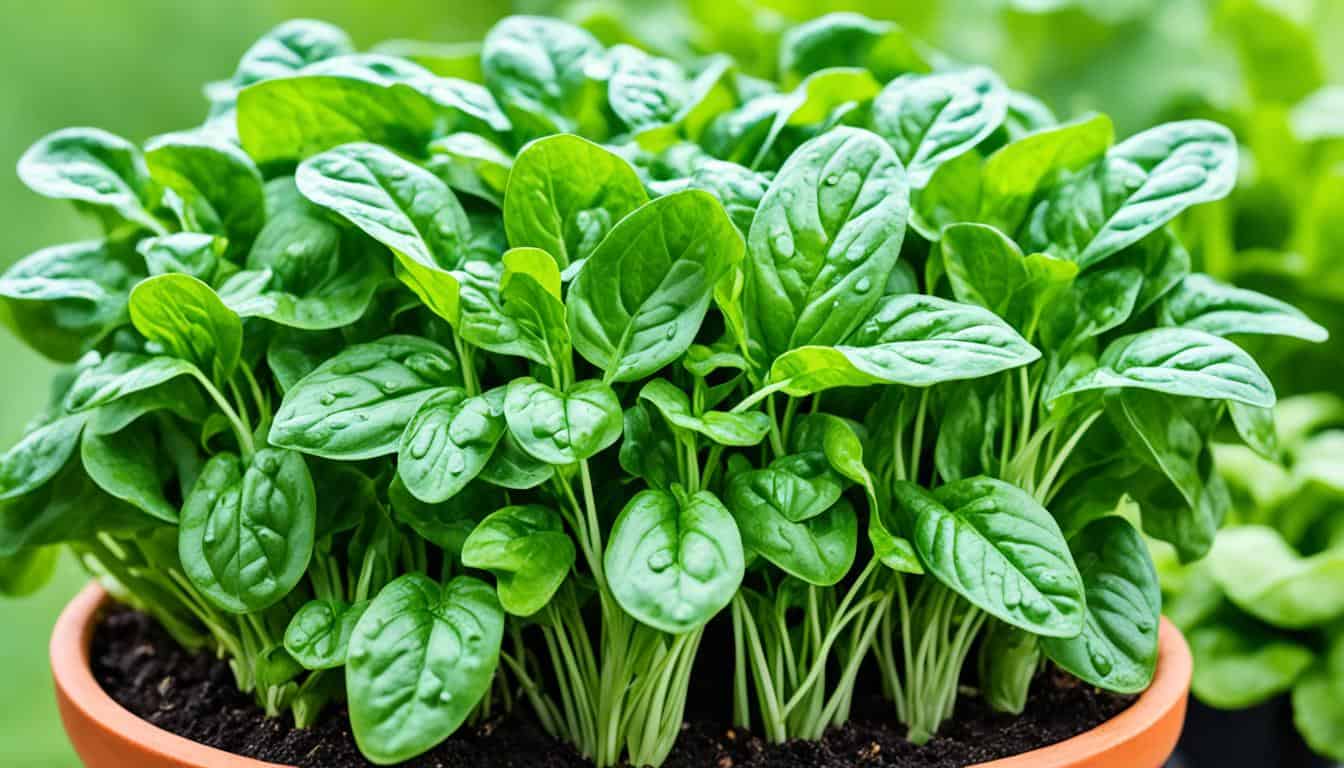
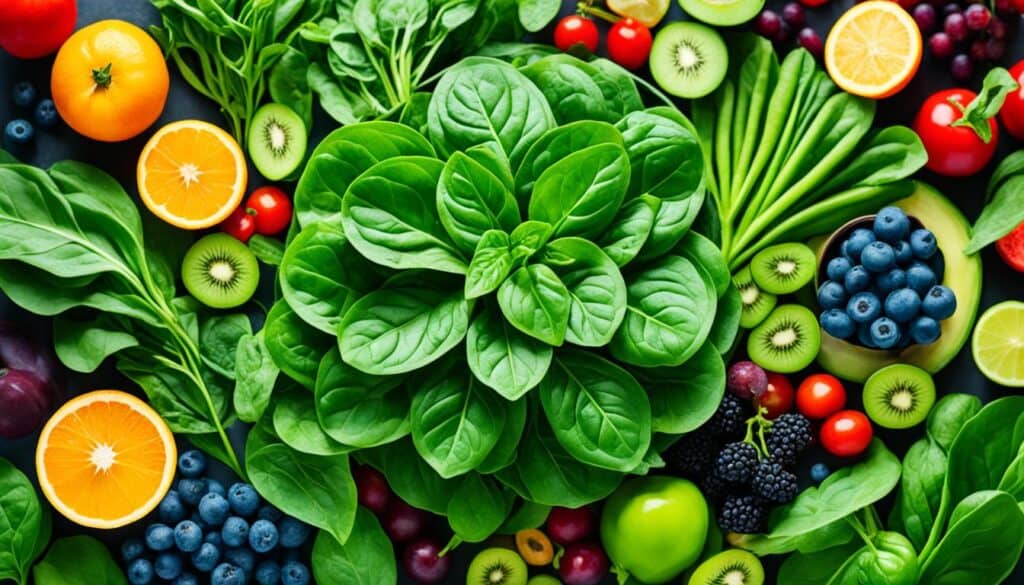
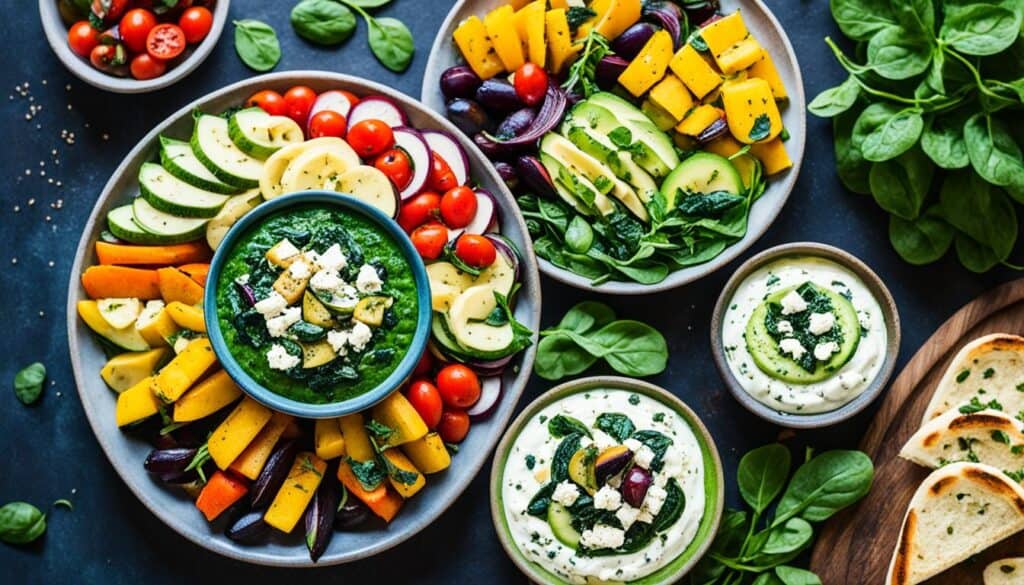
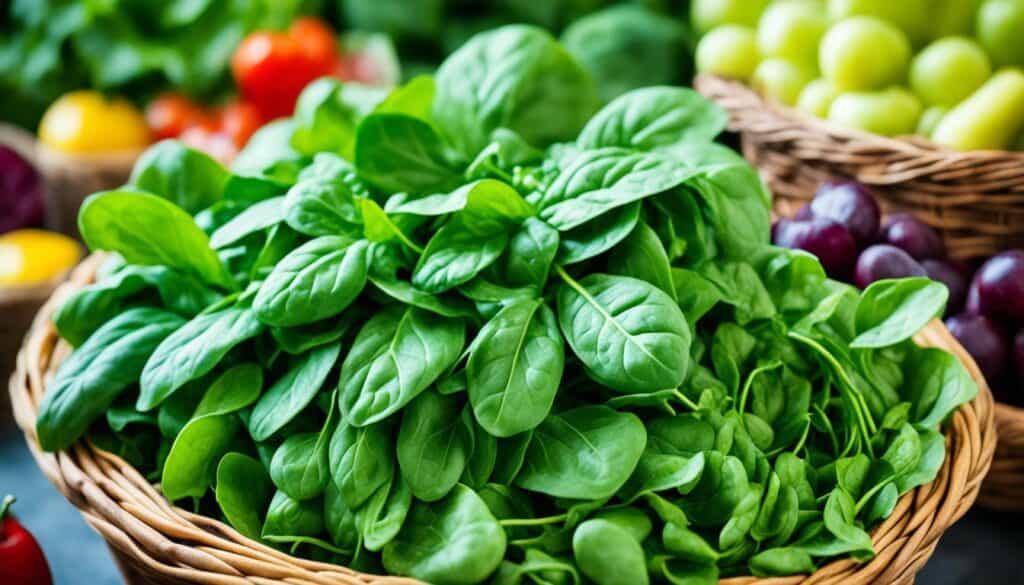

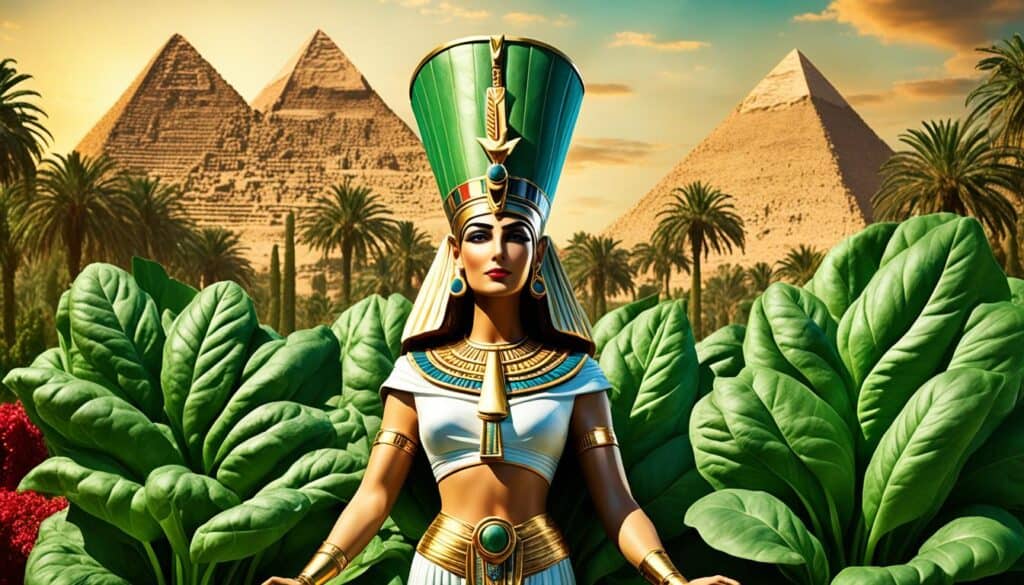



Leave a Reply